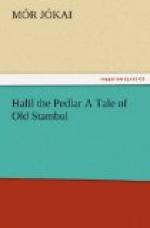Pelivan roared aloud at the blow, and, shaking his bloody forehead, rushed upon Patrona like a wounded bear, and disregarding a couple of fresh blows on the arms and shoulders which had the effect, however, of making him drop his yataghan, he grasped his adversary with his gigantic hands, lifted him up, and then hugged him with the embrace of a boa-constrictor. But now it appeared that Patrona also was by no means a novice in the art of self-defence, for clutching with both hands the giant’s throat, he squeezed it so tightly that in a few seconds the Janissary began to stagger to and fro, finally falling backwards to the ground, whereupon Patrona knelt upon his breast and plucked from his beard a sufficient number of hairs to serve him as a souvenir. Pelivan, overpowered by drink and the concussion of his fall, slumbered off where he lay, while Patrona with his guest, who was already half-dead with fright, hastened to reach his dwelling.
After traversing a labyrinth of narrow, meandering lanes, and zig-zagging backwards and forwards through all kinds of gardens and rookeries, Halil Patrona arrived at last at his own house.
Were we to speak of “his own street door,” we should be betraying a gross ignorance of locality, for in the place where Patrona lived the mere idea of a street never presented itself to anybody’s imagination. There was indeed no such thing there. The spot was covered by half a thousand or so of wooden houses, mixed together, higgledy-piggledy, so inextricably, that the shortest way to everybody’s house was through his neighbour’s passage, hall, or courtyard, and inasmuch as the inmates of whole rows of these houses were in the habit of living together in the closest and most mysterious harmony, every house was so arranged that the inhabitants thereof could slip into the neighbouring dwelling at a moment’s notice. In some cases, for instance, the roofs were continuous; in others the cellars communicated, so that if ever anyone of the inhabitants were suddenly pursued, he could, with the assistance of the roofs, passages, and cellars, vanish without leaving a trace behind him.
Halil Patrona’s house was of wood like the rest. It consisted of a single room, yet this was a room which could be made to hold a good deal. It had a fire-place also, and if perhaps a chance guest were a little fastidious, he could at any rate always make sure of a good bed on the roof, which was embowered in vine leaves. There was certainly no extravagant display of furniture inside. A rush-mat in the middle of the room, a bench covered with a carpet in the corner, a few wooden plates and dishes, a jug on a wooden shelf, and a couple of very simple cooking-utensils in the fire-place—that was all. From the roof of the chamber hung an earthenware lamp, which Patrona kindled with an old-fashioned flint and steel. Then he brought water in a round-bellied trough for his guest to wash his hands, fetched drinking-water from the well in a long jug, whereupon he drew forward his rush-woven market-basket, emptied its contents on to the rush-mat, sat him down opposite honest Janaki, and forthwith invited his guest to fall to.




